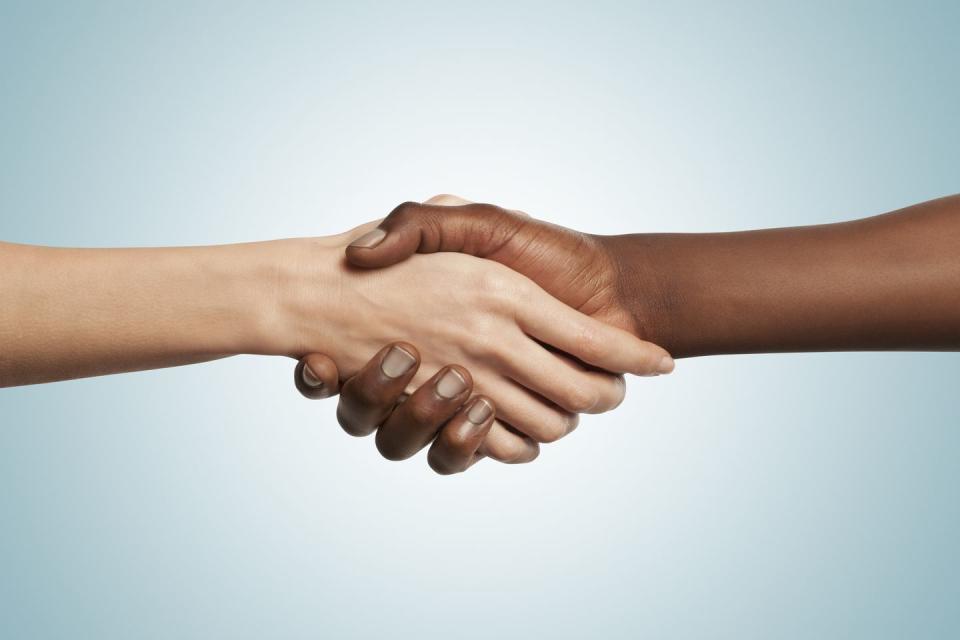Anyone With Social Anxiety Needs to Learn These 4 Self-Help Strategies

"Hearst Magazines and Yahoo may earn commission or revenue on some items through the links below."
Mindy Kaling — the talented actress, comedian, producer, writer, best-selling author, and your dream BFF — recently revealed she lives with "a little" social anxiety. "Going to parties where I don’t know most of the people is stressful to me," she said in an interview with Glamour. The witty, upbeat, and charismatic movie star also shared that she dreads small talk. "My greatest fear is that the person I’m talking to is dying to get out of the conversation, and they have to lie and say they have to go to the bathroom or get a drink."
But the truth is she's not alone. Anxiety disorders are the most common mental health issue in the U.S., where nearly 40 million Americans suffer from one. According to the Anxiety and Depression Association of America (ADAA), social anxiety disorder affects approximately 15 million American adults and it is the second most commonly diagnosed anxiety disorder following specific phobias. It also seems to be on the rise.
"We don’t always know causation in psychology — especially without being able to measure something for a long time — but there are a lot of correlational studies that are pointing to social media and digital phone use," says Alicia H. Clark, Psy.D., a licensed clinical psychologist and author of Hack Your Anxiety: How to Make Anxiety Wok for You, in Life, Love, and All That You Do. "Think about what our devices have done to the fabric of our society. When you go to a restaurant, you’ll see an entire family on their phones. While I’m sure [the rise in social anxiety] is a combination of many factors, I think all of us intuitively understand that it has something to do with technology."
How to Define Social Anxiety
Dr. Clark explains that social anxiety, which is also referred to as social phobia, is the fear of being judged. "This is what it boils down to and it extrapolates to any social situation," she continues. "It can be specific to certain social situations, it can be generalized to all social situations, but the anxiety is about judgement, and ultimately not being approved of and not being liked."
Social anxiety stems from the perception that something is wrong with us, says Ellen Hendriksen, Ph.D., a clinical psychologist and author of How to Be Yourself: Quiet Your Inner Critic and Rise Above Social Anxiety. "And the thought is that unless we work very hard to hide or conceal some flaw, we will be revealed," she states. "Even though there could be a grain of truth to it, the expected judgement — and the expected rejection — generally doesn’t happen."
When it comes to measuring one’s social anxiety, Dr. Clark says the difference between any kind of anxiety and a disorder is the degree to which it causes difficulty in your life.
"Perhaps you’re not going to work events and it has a consequence or you want to be in a relationship, but you’re not willing to go out — these would be examples of social anxiety getting in the way of a goal," she explains. "On a continuum, it would be feeling mildly uncomfortable to all the way to panic."
Dr. Hendriksen concurs. "For instance, it’s completely normal to feel anxious before a job interview, but to feel that level of anxiety before going to a yoga class is out of proportion," she adds.

How to Break the Anxiety Cycle
People who suffer from anxiety tend to be stuck in an ongoing loop of avoidance. "It’s the classic dynamic of anxiety: When we avoid the things we’re afraid of, our symptoms tend to increase, and in turn this drives the anxiety up and makes the thing we’re afraid of scarier," Dr. Clark says. But here’s the good news — the opposite is also true.
"The more strategies you use to deal with your anxiety, the better off you’re going to be and the more you’re going to protect yourself from developing a social anxiety disorder," she adds.
Here, Dr. Clark and Dr. Hendriksen offer confidence-boosting techniques on how to slowly overcome this mental health challenge:
1. Choose your words carefully.
Dr. Clark emphasizes the following phrase: Words have power. "How we label an experience drives a big part of how we experience it," she states. For example, saying, "I am panicked about going to this party tonight" will put you in a more negative state of mind compared to saying, "I’d prefer if I didn’t have to go to this party."
"The worst thing we can do is say to ourselves, 'I can’t handle it,' while the best thing we can say is, 'I may not like it, but I can handle it,'" Dr. Clark continues. "Start by nudging your words to the positive and to a point where you still feel it resonates."
2. Let go of perfectionism.
People with social anxiety feel as if they are walking on a social tightrope, Dr. Hendriksen explains. "It’s this idea that we need to perform perfectly," she says. "We have unrealistic high standards where we think we must be cool, positive, and witty while carrying the entire conversation — it’s too much." Instead, she encourages her clients to change their goal to simply connecting with someone. "Focus on being warm and being kind." Also, remember that it’s not a performance. "And keep in mind that you are not expected to be someone you’re not in order to get people to like you."
3. Make small gestures.
Instead of "jumping off a cliff" and walking straight into a situation that makes you anxious, Dr. Hendriksen advises to start becoming more expressive in situations that you feel are less threatening. For example, ask a stranger for directions, say good morning to a neighbor you rarely speak with, or tell your hairstylist the exact look you’re going for instead of agreeing with their suggestion. "As we challenge ourselves, we gain evidence that we can do more than what we think."
4. Shift your awareness.
Our attention is like a spotlight and we choose where to point it, states Dr. Hendriksen. "Those with social anxiety tend to point that spotlight inward and illuminate the commentary of our inner critic," she continues. "We regularly self-monitor and ask our inner critic how things are going — and of course our critic will say it’s going horribly."
However, she explains that the antidote is turning that spotlight outward. "Look around your environment, pay attention to what another person is actually saying, even focus on their face," Dr. Hendriksen suggests. "Focus on what’s happening around you, not inside you."
5. Seek help.
Keep in mind that those who suffer from this chronic mental health condition are at an increased risk for developing major depressive disorder and alcohol use disorders, but professional guidance can help reduce feelings of social anxiety. The treatment approach would likely include medication, as well as cognitive-behavioral therapy.
"Anxiety disorders are highly treatable, but sadly, there are a staggering number of people who do not receive help," Dr. Clark states. (The ADAA reports this number hovers around 37%.) For this reason, she applauds Kaling for going public about her fear.
"What I love about celebrities disclosing their struggles is that it helps so much with stigma," she concludes. "It’s important for people to know they are not alone, help is out there, and help works. You do not have to suffer in silence."
For more resources, visit the Anxiety and Depression Association of America at adaa.org or call the SAMHSA National Helpline at 1-800-662-HELP (4357).
You Might Also Like

